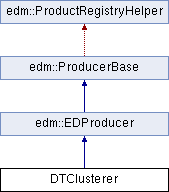


|
 |
#include <DTClusterer.h>

Classes | |
| struct | sortClusterByX |
Public Member Functions | |
| DTClusterer (const edm::ParameterSet &) | |
| virtual void | produce (edm::Event &event, const edm::EventSetup &setup) |
| virtual | ~DTClusterer () |
Private Member Functions | |
| std::vector< DTSLRecCluster > | buildClusters (const DTSuperLayer *sl, std::vector< DTRecHit1DPair > &pairs) |
| unsigned int | differentLayers (std::vector< DTRecHit1DPair > &hits) |
| std::vector< std::pair< float, DTRecHit1DPair > > | initHits (const DTSuperLayer *sl, std::vector< DTRecHit1DPair > &pairs) |
Private Attributes | |
| bool | debug |
| unsigned int | theMinHits |
| unsigned int | theMinLayers |
| edm::InputTag | theRecHits1DLabel |
| DTClusterer::DTClusterer | ( | const edm::ParameterSet & | pset | ) |
Definition at line 40 of file DTClusterer.cc.
References gather_cfg::cout, debug, edm::ParameterSet::getParameter(), and edm::ParameterSet::getUntrackedParameter().
{
// Set verbose output
debug = pset.getUntrackedParameter<bool>("debug");
// the name of the 1D rec hits collection
theRecHits1DLabel = pset.getParameter<InputTag>("recHits1DLabel");
// min number of hits to build a cluster
theMinHits = pset.getParameter<unsigned int>("minHits");
// min number of hits to build a cluster
theMinLayers = pset.getParameter<unsigned int>("minLayers");
if(debug)
cout << "[DTClusterer] Constructor called" << endl;
produces<DTRecClusterCollection>();
}
| DTClusterer::~DTClusterer | ( | ) | [virtual] |
Definition at line 58 of file DTClusterer.cc.
{
}
| vector< DTSLRecCluster > DTClusterer::buildClusters | ( | const DTSuperLayer * | sl, |
| std::vector< DTRecHit1DPair > & | pairs | ||
| ) | [private] |
Definition at line 105 of file DTClusterer.cc.
References abs, gather_cfg::cout, debug, DTSuperLayer::id(), plotscripts::mean(), and query::result.
{
// create a vector of hits with wire position in SL frame
vector<pair<float, DTRecHit1DPair> > hits = initHits(sl, pairs);
vector<DTSLRecCluster> result;
// loop over pairs
vector<DTRecHit1DPair> adiacentPairs;
float lastPos=hits.front().first;
const float cellWidth=4.2; // cm
float sum=0.;
float sum2=0.;
for (vector<pair<float, DTRecHit1DPair> >::const_iterator hit=hits.begin(); hit!=hits.end();
++hit) {
if(debug) cout << "Hit: " << (*hit).first << " lastPos: " << lastPos << endl;
// start from first hits
// two cells are adiacente if their position is closer than cell width
if(abs((*hit).first-lastPos)>cellWidth ) {
if (adiacentPairs.size() >= theMinHits && differentLayers(adiacentPairs)>=theMinLayers) {
// if not, build the cluster with so far collection hits and go on
float mean=sum/adiacentPairs.size();
float err2=sum2/adiacentPairs.size()-mean*mean;
DTSLRecCluster cluster(sl->id(),
LocalPoint(mean,0.,0.),
LocalError(err2,0.,0.),
adiacentPairs);
if(debug) cout << "Cluster " << cluster << endl;
result.push_back(cluster);
}
// clean the vector
adiacentPairs.clear();
sum=0.;
sum2=0.;
}
// if adiacente, add them to a vector
adiacentPairs.push_back((*hit).second);
if(debug) cout << "adiacentPairs " << adiacentPairs.size() << endl;
sum+=(*hit).first;
sum2+=(*hit).first*(*hit).first;
lastPos=(*hit).first;
}
// build the last cluster
if (adiacentPairs.size() >= theMinHits && differentLayers(adiacentPairs)>=theMinLayers) {
float mean=sum/adiacentPairs.size();
float err2=sum2/adiacentPairs.size()-mean*mean;
DTSLRecCluster cluster(sl->id(),
LocalPoint(mean,0.,0.),
LocalError(err2,0.,0.),
adiacentPairs);
if(debug) cout << "Cluster " << cluster << endl;
result.push_back(cluster);
}
return result;
}
| unsigned int DTClusterer::differentLayers | ( | std::vector< DTRecHit1DPair > & | hits | ) | [private] |
Definition at line 186 of file DTClusterer.cc.
References pos, and query::result.
| std::vector<std::pair<float, DTRecHit1DPair> > DTClusterer::initHits | ( | const DTSuperLayer * | sl, |
| std::vector< DTRecHit1DPair > & | pairs | ||
| ) | [private] |
| void DTClusterer::produce | ( | edm::Event & | event, |
| const edm::EventSetup & | setup | ||
| ) | [virtual] |
Implements edm::EDProducer.
Definition at line 62 of file DTClusterer.cc.
References gather_cfg::cout, debug, edm::EventSetup::get(), DTSuperLayer::id(), DTRangeMapAccessor::layersBySuperLayer(), and DTLayerId::superlayerId().
{
if(debug)
cout << "[DTClusterer] produce called" << endl;
// Get the DT Geometry
ESHandle<DTGeometry> dtGeom;
setup.get<MuonGeometryRecord>().get(dtGeom);
// Get the 1D rechits from the event
Handle<DTRecHitCollection> allHits;
event.getByLabel(theRecHits1DLabel, allHits);
// Create the pointer to the collection which will store the rechits
auto_ptr<DTRecClusterCollection> clusters(new DTRecClusterCollection());
// Iterate through all hit collections ordered by LayerId
DTRecHitCollection::id_iterator dtLayerIt;
DTSuperLayerId oldSlId;
for (dtLayerIt = allHits->id_begin(); dtLayerIt != allHits->id_end(); ++dtLayerIt){
// The layerId
DTLayerId layerId = (*dtLayerIt);
const DTSuperLayerId SLId = layerId.superlayerId();
if (SLId==oldSlId) continue; // I'm on the same SL as before
oldSlId = SLId;
if(debug) cout <<"Reconstructing the clusters in "<< SLId << endl;
const DTSuperLayer* sl = dtGeom->superLayer(SLId);
// Get all the rec hit in the same superLayer in which layerId relies
DTRecHitCollection::range range =
allHits->get(DTRangeMapAccessor::layersBySuperLayer(SLId));
// Fill the vector with the 1D RecHit
vector<DTRecHit1DPair> pairs(range.first,range.second);
if(debug) cout << "Number of 1D-RecHit pairs " << pairs.size() << endl;
vector<DTSLRecCluster> clus=buildClusters(sl, pairs);
if(debug) cout << "Number of clusters build " << clus.size() << endl;
if (clus.size() > 0 )
clusters->put(sl->id(), clus.begin(), clus.end());
}
event.put(clusters);
}
bool DTClusterer::debug [private] |
Definition at line 74 of file DTClusterer.h.
unsigned int DTClusterer::theMinHits [private] |
Definition at line 76 of file DTClusterer.h.
unsigned int DTClusterer::theMinLayers [private] |
Definition at line 77 of file DTClusterer.h.
edm::InputTag DTClusterer::theRecHits1DLabel [private] |
Definition at line 78 of file DTClusterer.h.
 1.7.3
1.7.3